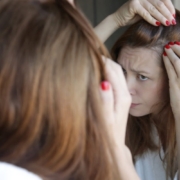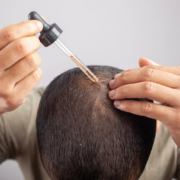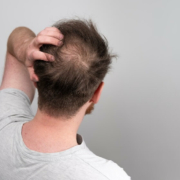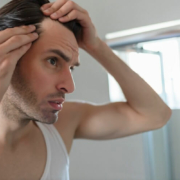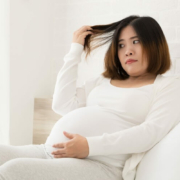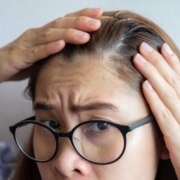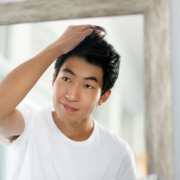Devastated About Your Hair Loss? Tips to Help You Cope.
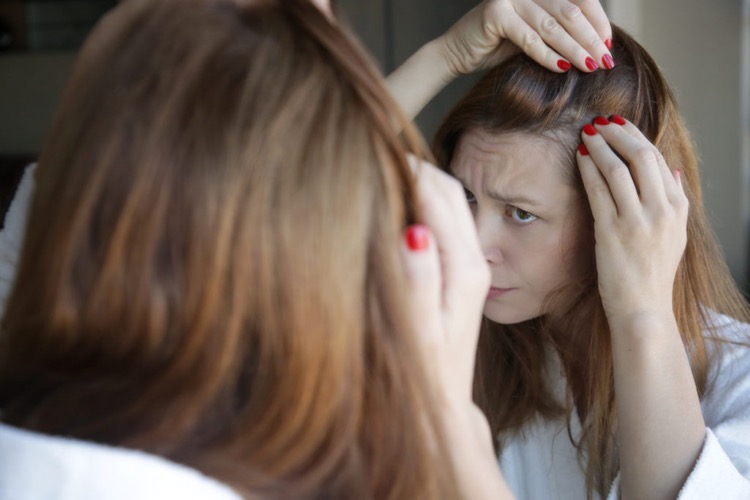
“It seems to me that being “not okay” is a perfectly acceptable response to this unwanted, unannounced situation. There’s nothing wrong with feeling “not okay” on some days or in some situations. We are grieving the loss of our hair, the loss of our identity, the loss of our sense of self, and the loss of our confidence.”
– Sarah, Member of Alopecia Areata, Find a Cure (01)
In January of 2020, Massachusetts Representative Ayanna Pressley made an announcement with a video that she has alopecia. Much like Jada Pinkett Smith, Pressley is in the public eye and tried to hide her condition as long as she could. Pressley decided that she was done hiding. She took off her wig and shared her story. The video helped Pressley make peace with her condition. Coming forward helped Pinkett Smith in a similar way. “Me and this alopecia are going to be friends,” said Pinkett Smith.
Alopecia may not be life-threatening, but it’s upsetting no matter what type you have. Whether you have androgenic alopecia, alopecia areata, telogen effluvium, or any other kind of alopecia, men and women go through a similar grieving process when losing their hair. (02)
Society’s expectations of what’s attractive don’t make it easy to accept your hair loss. Somehow we can talk about sex, curse, and even be openly rude to each other, but revealing that you’re balding or completely bald is shocking and newsworthy.
So how do you get to the point when you’re “okay” when it feels like you never will be? We asked Rachel, one of our staff writers with lichen planopilaris, an autoimmune alopecia, how she got there.
Q. How did you find out that you had alopecia?
Rachel: When my son was about one and a half, I noticed a lot of hair in the shower and sink. My hairline also started to recede on one side. I had just had two babies back-to-back, and I figured that my hair was falling out from the hormonal changes. I thought it would grow back.
Then, during a routine visit to the dermatologist, I had my doctor take a look. He took a biopsy, which I thought was overkill for a slight hormonal imbalance, and I didn’t think about it again until I got a phone call. The call wasn’t from a nurse or an assistant. The dermatologist called me himself. I knew right away that the news wasn’t going to be good.
Q. How did you react when you found out that you have alopecia?
Rachel: I remember being really upset and desperately hoping that my dermatologist was wrong. I was a ballet dancer all of my life and always had my hair back in a ponytail or a bun. There wasn’t a way to hide the recession, and I wasn’t sure how to make my hair look presentable.
Q. How did your alopecia diagnosis affect you emotionally?
Rachel: It was a tough time. I hated the way my hair looked, and I kept imagining what I would look like as the rest of it fell out. On top of that, I felt guilty about being so vain. People get all kinds of horrific diseases as they age, yet I was lucky enough only to get something cosmetic. I didn’t think I had the right to be so upset about my hair. Looking back, I wish I could tell my younger self that it’s okay to be upset. It’s a natural part of the healing process.
Q. How did you treat your alopecia? Did it help?
Rachel: Shortly after I was diagnosed, I found a top dermatologist in my area who specializes in hair loss. Initially, I was treated with steroid injections (yes, they hurt), topical Clobetesol, five percent Minoxidil, and Tacrolimus. The goal was to prevent further hair loss and strengthen the surrounding hair.
My alopecia went into remission for over ten years, but recently flared up again. My treatment this time around is a bit different. It’s amazing how much research has been conducted and how much has been learned since I first started on this journey. My dermatologist added Finasteride to my treatment plan. Much to my surprise, I’m seeing small areas where hair is growing back. I didn’t expect that to happen.
Q. What did you do to get to a better place emotionally when you were feeling down about your hair loss?
Rachel: I set a time limit to allow myself to be upset. I gave myself a week and decided that after the week was over, I would let my sadness go and focus on other things. The time limit gave me power over my emotions and the situation when I didn’t have any control.
When the lichen planopilaris flared up after being in remission for so long, I regressed a bit. I wasn’t as upset as I was the first time because I had some experience, but I definitely got emotional. I had to go through the same process of limiting my grief. I think emotions tend to ebb and flow with alopecia. Everyone has to find what works for them when managing those strong emotions.
Q. A lot of people with alopecia are at a loss about how to style their hair. What did you do?
Rachel: I visited my hair salon and got a sassy, short haircut. I wasn’t sure that I would like short hair, but it’s since become my style. If my alopecia gets so bad at some point that I have to cut it shorter, I will.
Ironically, this process has given me confidence and taught me to own my look, whatever that is at the time. Although it’s not a choice that everyone would make, I found that cutting my hair was liberating. I followed the protocol that my doctor prescribed for me, but I stopped fretting about every hair that I saw in the sink.
Q. What advice do you have for other men and women who are experiencing hair loss?
Rachel: Most importantly, find a board-certified dermatologist who you like and respect. You’re going to need a supportive partner. If you don’t think you have the right professional on your side, get second opinions until you find the right person.
Secondly, I’m in a few Facebook groups for people with alopecia and read about how many are apprehensive about testing. If your dermatologist recommends getting blood work or a biopsy, do it. The blood test isn’t a big deal, and the biopsy area is small. Your dermatologist will numb the area. You won’t feel anything, and the site heals quickly. The small bit of aggravation is worth knowing if you have a form of alopecia. You can then move quickly into treatment.
Lastly, be kind to yourself. It takes time to come to terms with your hair loss. If you visit online or in-person support groups, you’ll see that you’re not the only one experiencing alopecia. Millions of other people are in your boat. It’s common for people with alopecia to suffer from anxiety or depression. (03) If this is the case for you, don’t hesitate to seek help from a professional therapist or psychologist.
Healing from the sting of learning that you have a form of alopecia isn’t easy. Now that we’ve heard Rachel’s story, we would love to hear yours. What tricks have you used to make yourself feel better emotionally when dealing with alopecia? And if you’d like to get your FREE consultation with a Happy Head dermatologist and get prescribed a custom hair loss treatment all online, take the questionnaire here.
Resources:
(01) Name has been changed for confidentiality
(02, 03) https://www.ncbi.nlm.nih.gov/pmc/articles/PMC1261195/#ref11

